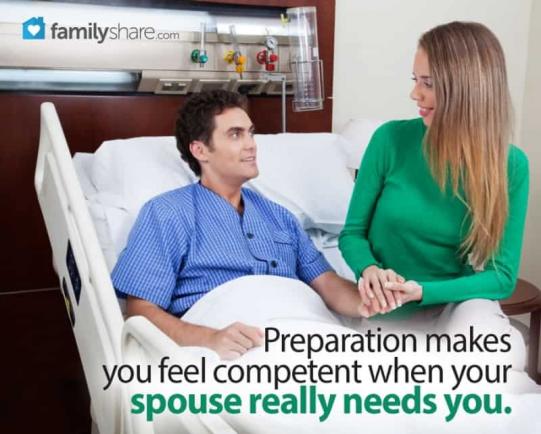
Most people go to the emergency room at least once during their childhood. Whether it's a high fever, a dog bite or a broken bone, something is bound to happen that ends in an E.R. visit. Your parents take you to the hospital and do all the grown-up stuff. Your only responsibility is to feel better.
But what about when it's your spouse that needs to feel better? That leaves you to do all the grown-up stuff, and that can be a pretty scary venture when it's your first time. Here, we offer some things to think about in preparation for that inevitable moment. It won't be all roses and sunshine, but at least you can feel competent at a time when your spouse really needs you.
Keep each other informed
My husband recently took himself to the doctor for chest pains. The first I heard about it, however, was when he called to tell me that they were taking him to the hospital in an ambulance. I panicked, and it was not pretty. So do each other a favor - communicate! Ask your spouse to keep you informed of his health, and give you a play-by-play of anything he does about his health. It may feel a little silly at first because there isn't always a lot to tell, but open communication is always a sign of love and trust, even when it's not terribly interesting.
Know your spouse's personal information
You probably already have her full name and birthdate memorized, but the hospital will need to know all sorts of things about your spouse. Have a copy of her insurance card and social security card on file, and bring it to the ER with you. The hospital staff will also ask you about any allergies to medication along with the symptoms of those allergies. Knowing this information (or at least having it written down and available) will make you a huge help both to the doctors and to your sweetheart.
Bring something to do
really
Depending on the severity of your spouse's needs, as well as the volume of patients in the emergency room, you may have to wait for a really long time. Rather than stewing in worry and impatience, try to get your mind off of things. While my husband and I waited for the doctor, I suggested that we do crosswords on his smartphone. This familiar, low-key activity minimized our anxiety and kept us busy for the hours that we waited. As a result, we were able to be more cheerful with each other as well with as the nurses, making our hospital visit much more pleasant in general.
Don't panic
Remember, your spouse is the one who needs you to be mature and encouraging right now, not the other way around. Now is not the time to worry about how you are going to afford the hospital bill or how much your life will change if the test results are positive. There will be plenty of time for that later if it comes to that. For now, you don't know enough to make any plans so don't bother. Focus on this bonding moment with your spouse as you demonstrate maturity and work to make him or her as comfortable and relaxed as possible.
Knowing about your spouse's health takes out the guesswork and surprise from the equation, but sometimes things change unexpectedly. Having your spouse's information on-hand makes you useful in those moments and helps to assure that your spouse gets prompt medical attention. As for you, a book, MP3 player or deck of cards prevents your mind from exploring scary, "What if?"� scenarios. All of these elements together allow you to give your spouse exactly what he or she needs now and always - your support and love.

